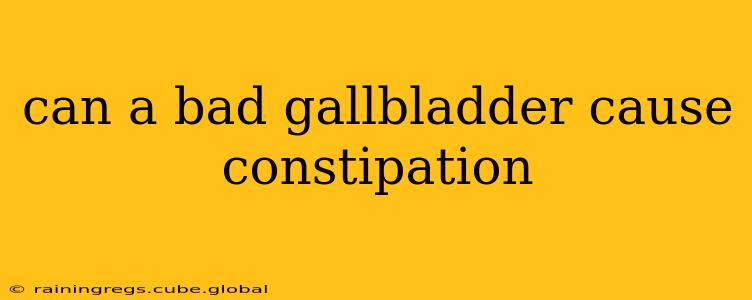While not a direct cause, gallbladder issues can indirectly lead to constipation in several ways. It's crucial to understand the relationship isn't straightforward, and other factors often contribute. Let's explore the potential connections and address common questions.
How Can Gallbladder Problems Affect Bowel Movements?
The gallbladder, a small organ under the liver, stores bile crucial for digesting fats. When the gallbladder malfunctions—due to gallstones, inflammation (cholecystitis), or other conditions—bile production and flow can be disrupted. This disruption can indirectly impact digestion and, consequently, bowel movements.
Here's how:
-
Fat Malabsorption: Insufficient bile leads to poor fat absorption. Undigested fats can draw water into the intestines, potentially causing diarrhea initially. However, prolonged fat malabsorption can, paradoxically, lead to constipation because the stool becomes harder and more difficult to pass. This is due to reduced stool volume and consistency changes.
-
Changes in Gut Microbiota: Gallbladder problems can sometimes trigger alterations in the gut microbiome—the community of bacteria living in your intestines. An imbalance (dysbiosis) in gut bacteria can impact bowel regularity, contributing to constipation or other digestive issues.
-
Pain and Reduced Physical Activity: Gallbladder attacks can be extremely painful, limiting physical activity. Decreased physical activity is a well-known factor contributing to constipation.
-
Medication Side Effects: Medications prescribed to treat gallbladder issues, such as pain relievers or antispasmodics, may have constipation as a side effect.
What Other Symptoms Might I Experience With a Bad Gallbladder?
Constipation is not the primary or most common symptom of gallbladder problems. Other symptoms are far more indicative, and it's essential to consult a doctor for diagnosis. These symptoms include:
- Severe abdominal pain, often in the upper right quadrant, radiating to the back or right shoulder.
- Nausea and vomiting.
- Gas and bloating.
- Indigestion or heartburn.
- Fever and chills (if infection is present).
- Jaundice (yellowing of the skin and eyes, if bile ducts are blocked).
Is Constipation Always a Sign of Gallbladder Problems?
No, absolutely not. Constipation has many causes, including diet, dehydration, lack of exercise, medication side effects, and various medical conditions. Constipation alone is insufficient evidence to diagnose a gallbladder problem.
Can Gallbladder Removal Cause Constipation?
Gallbladder removal (cholecystectomy) rarely directly causes constipation. While some individuals may experience temporary digestive changes post-surgery, including changes in bowel habits, it's usually not a long-term effect. Persistent constipation after gallbladder removal should be investigated separately.
When Should I See a Doctor About Constipation and Potential Gallbladder Issues?
If you're experiencing persistent constipation along with other symptoms mentioned above (especially abdominal pain), it's crucial to seek medical attention. Your doctor can perform tests (such as blood tests, imaging studies like ultrasound or CT scan) to diagnose the underlying cause of your symptoms. Do not attempt self-diagnosis or treatment.
How is a Gallbladder Problem Diagnosed?
Diagnosis typically involves a combination of:
- Physical Examination: Your doctor will assess your symptoms and perform a physical exam.
- Blood Tests: To check liver function and rule out other conditions.
- Imaging Studies: Ultrasound is often the first-line imaging technique to visualize the gallbladder and detect gallstones. Other tests like CT scans or MRCP may be used.
Remember: This information is for educational purposes only and does not constitute medical advice. Always consult with a healthcare professional for any health concerns or before making any decisions related to your health or treatment.
